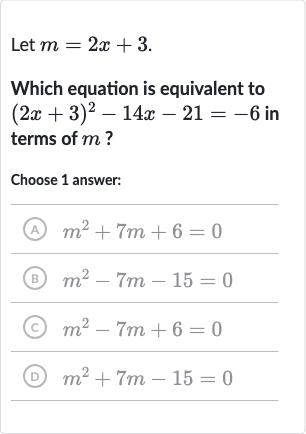Full solution
Q. Let . Which equation is equivalent to in terms of ? Choose answer: (A) (B) (C) (D)
- Substitute into equation: We are given . Let's substitute into the given equation to find the equivalent equation in terms of .
- Replace with : First, we substitute into the equation: .
- Simplify by combining like terms: Since , we can replace with because and . So, .
- Add to both sides: Now we substitute for in the equation: .
- Add to both sides: Now we substitute for in the equation: .Next, we simplify the equation by combining like terms: .
- Add to both sides: Now we substitute for in the equation: .Next, we simplify the equation by combining like terms: .The and cancel each other out, so we are left with: .
- Add to both sides: Now we substitute for in the equation: .Next, we simplify the equation by combining like terms: .The and cancel each other out, so we are left with: .To get the equation in the standard form, we add to both sides of the equation: .
- Add to both sides: Now we substitute for in the equation: .Next, we simplify the equation by combining like terms: .The and cancel each other out, so we are left with: .To get the equation in the standard form, we add to both sides of the equation: .We have now found the equivalent equation in terms of , which is . This corresponds to answer choice (C).
More problems from Solve a quadratic equation by factoring
QuestionGet tutor help
QuestionGet tutor help
QuestionGet tutor help
QuestionGet tutor help
QuestionGet tutor help
QuestionGet tutor help
QuestionGet tutor help
QuestionGet tutor help

